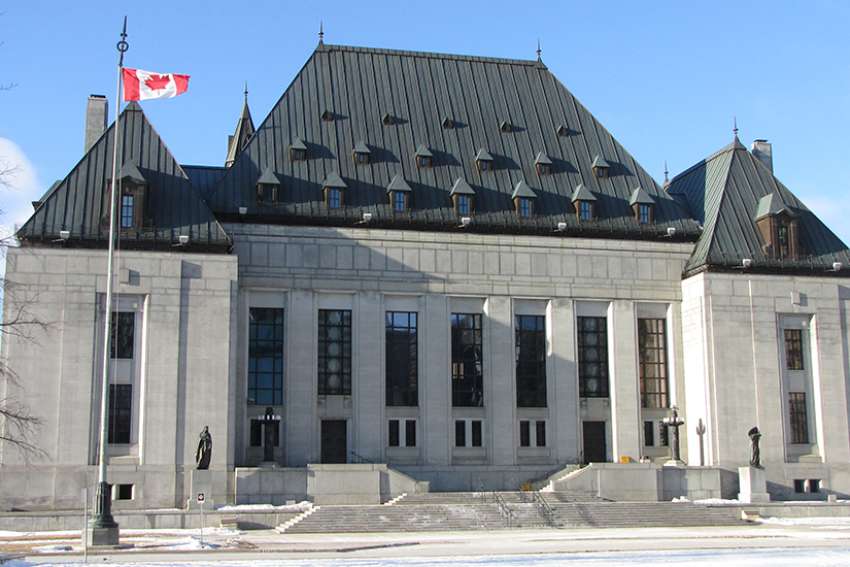The Supreme Court of Canada ruled unanimously that courts have no authority to decide on religious group rules May 31.
Wikimedia Commons
Supreme court ruling a boost for religious freedom
By Deborah Gyapong, Canadian Catholic News
OTTAWA – Courts have no place in deciding a religious group’s rules, the Supreme Court said in a unanimous judgment May 31.
The decision involving the case of a man who was expelled from his Jehovah’s Witness congregation is being hailed as a victory for religious freedom and associational rights in Canada.
The Catholic Civil Rights League applauded the ruling written by Justice Malcolm Rowe “as a strong statement in recognition of the independence of private religious institutions.”
“Mr. Justice Rowe’s reasons provide a strong statement on the limited role courts should have on reviewing internal decisions of private institutions and, in particular, ecclesiastical bodies,” said League president Phil Horgan. “We are pleased with the court’s analysis of the limited role for judicial review of such institutional decisions, and the further recognition that secular courts are not qualified to rule on theological or ecclesiastical concerns. Every private institution serves to benefit from this analysis, especially those with underlying religious conceptions.”
The case involved Randy Wall, who sought a judicial review of an Alberta Jehovah’s Witness congregation’s decision to “disfellowship” or excommunicate him. He argued the decision violated “procedural fairness” and negatively impacted his real estate business because once he was excommunicated, Jehovah’s Witnesses refused to patronize his business. Two lower courts agreed.
Canada’s highest court allowed the appeal by the Highwood Congregation of Jehovah’s Witnesses, thus overturning the Alberta Court of Appeal decision.
“In this case, the Congregation’s Judicial Committee was not exercising statutory authority,” the court ruled. “Second, there is no free-standing right to procedural fairness. Courts may only interfere to address the procedural fairness concerns related to the decisions of religious groups or other voluntary associations if legal rights are at stake. Third, even where review is available, the courts will consider only those issues that are justiciable. Issues of theology are not justiciable.”
“It means private religious communities are private religious communities; they are not subject to court oversight unless they violate the law or the legal rights of individuals,” said Albertos Polizogopoulos, who represented both the Evangelical Fellowship of Canada and the Catholic Civil Rights League before the court. “It’s not necessarily a religious freedom case, but the effect of it is good for religious freedom.
“In the end, religious groups are free to determine their own membership and rules,” the Supreme Court ruled. “Courts will not intervene in such matters save where it is necessary to resolve an underlying legal dispute.
It also said: “The courts have neither legitimacy nor institutional capacity to deal with contentious matters of religious doctrine.”
The Canadian Council of Christian Charities (CCCC), another intervener, welcomed the decision. “It supports the rights of religious communities to deal with their members and not have their own disciplinary matters reviewed by the courts,” said the CCCC’s director, legal affairs Barry Bussey.
The decision impacts not only the rights of religious communities but also the associational rights of all Canadians, stressed the Justice Centre for Constitutional Freedoms, another intervener.
“The Supreme Court’s ruling provides clarity to Canadians that neither courts nor governments can legally compel citizens to associate together unwillingly,” said constitutional lawyer John Carpay, president of the Centre.
Tagged under:
Please support The Catholic Register
Unlike many media companies, The Catholic Register has never charged readers for access to the news and information on our website. We want to keep our award-winning journalism as widely available as possible. But we need your help.
For more than 125 years, The Register has been a trusted source of faith-based journalism. By making even a small donation you help ensure our future as an important voice in the Catholic Church. If you support the mission of Catholic journalism, please donate today. Thank you.
DONATE

